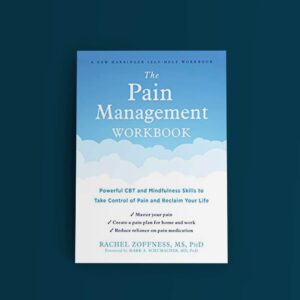by Rona | Jul 6, 2023 | KPFA, Podcasts, Radio Shows
Pain is an unpleasant signal and complex experience when something hurts. It’s an important message to let us know something is wrong, and to help us to take action to prevent further harm. Pain will often go away on its own, but it can also persist and become chronic pain, which is one of the most common reasons people seek out medical care.
My guest, Dr. Rachel Zoffness, will help us understand the three important domains of chronic pain: biology, psychology, and social factors. Successful treatment often requires addressing these three prongs of pain.
Listen now to About Health (7/10/23) on 94.1FM—KPFA.ORG
Guest:

Dr. Rachel Zoffness is a leading global pain expert, international speaker, author, and thought-leader in medicine, revolutionizing the way we understand and treat pain. She is a pain psychologist, Assistant Clinical Professor at UCSF, and lectures at Stanford. Dr. Zoffness is the author of The Pain Management Workbook and The Chronic Pain and Illness Workbook for Teens, the first pain workbook for kids. A passionate pain educator, she is a regular guest on popular health podcasts, and her episodes have over 6 million downloads. Dr. Zoffness was trained at Brown University, Columbia, UC San Diego, NYU, and Mt. Sinai Hospital. You can learn more at https://www.zoffness.com

by Rona | Sep 12, 2018 | Announcements, Appearances, KPFA, Podcasts, Radio Shows
Listen now to the show we did on 9/17/18, on About Health on KPFA.org, 94.1FM

If you suffer from chronic pain, you are not alone. It’s been reported that 100 million people in the US suffer from chronic pain, and 66% of sufferers expect to live with some pain for the rest of their lives. Many people with chronic pain feel isolated, and need friends, family, or counselors, to help them cope with the many emotions that come with ongoing pain. Aside from medication treatment, there are many other strategies people find helpful in managing their pain, and we will talk with our listeners about what has helped them. We will also discuss the stigma associated with people who have chronic pain, and what kinds of things can relieve that burden.
Guests:
Marsha Haller, MD did her residency training at San Francisco General Hospital/UCSF in Psychiatry and Family Medicine. She also completed a fellowship in Urban Family Health, and the Geriatric Teaching Program at Mt Sinai Hospital. Dr. Haller was board certified in Geriatric Medicine in 1990. During her academic career, she developed courses on cross-cultural and psychosocial aspects of family medicine, and geriatric psychopharmacology. For 12 years she worked at the Alameda Family Physicians, where she treated adults and children. During this time, she developed particular interest in chronic myofascial pain, and deepened her commitment to a more holistic approach to health and healing. In 2004 she became a Diplomate of the American Academy of Medical Acupuncture. For the last 16 years, her Berkeley practice has been devoted to medical acupuncture and related techniques. She is committed to fostering lifestyle changes that lead to better individual and global health. She also works for the San Francisco Department of Public Health at Tom Waddell Health Center in the Tenderloin doing urgent care.
Jennifer Ault, D.O. is a former physical therapist who is currently board certified in Neurology and Pain Medicine. She graduated from Touro University College of osteopathic medicine in 2007 and completed her residency at Dartmouth medical school in New Hampshire. She has been with Sutter East Bay physicians medical group since September 2012. Dr. Ault specializes in the treatment of acute and chronic pain emanating from the nervous system. She provides multi-disciplinary care, including formulating medication recommendations if appropriate. She also recommends physical, complimentary, and behavioral treatments as appropriate. She provides full scope of interventional procedures in the treatment of these and other painful conditions. These include but are not limited to: epidural injections, spinal and peripheral lead stimulation, lumbar sympathetic blocks, stellate ganglion blocks, radiofrequency ablation, ultrasound guided nerve blocks and joint injections, lumbar facet and sacroiliac joint injections, and occipital and sphenopalatine nerve blockade.



